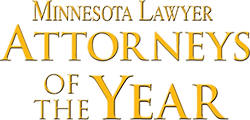Minnesota Pardons
Home – Practice Areas – Blogs - Pardons
Pardon Me? The Last Resort to Clear A Criminal Conviction in Minnesota
If you are charged with a crime in Minnesota, all court records and information relating to the charges are filed with the district court and automatically become public record. This means your entire criminal history is viewable at any time by any member of the public including anyone running a background check looking for information against you that may be damaging.
Your criminal history consists of all files and records of any felony, gross misdemeanor, misdemeanor, or petty misdemeanor charges brought against you in the past including any sentence that was imposed if you were convicted.
Today, approximately 77 million Americans – one in three adults – have a record that often causes problems in their lives. Having a record can have a negative effect on opportunities involving housing, education and government aid, among others.
Although Minnesota has a ‘ban the box’ law prohibiting an employer from considering the criminal history of an applicant prior to the interview or selection process, employers are allowed to inform applicants that convictions for certain crimes will automatically disqualify them from certain jobs.
In some cases, a record will also prevent a person from obtaining a necessary license or other government approval that is required before they can work in certain occupations and professions.
Unfortunately, these and many other collateral consequences of having a record can continue long after the court file is closed.
In Minnesota, your criminal history will continue to be public record indefinitely unless the court record is:
- Sealed pursuant to a state law;
- Destroyed pursuant to the court’s retention schedule; or
- Expunged pursuant to a court order from a district court judge.
In this article, we will take a general look at expungement law in Minnesota – how it works, and which persons are eligible for the relief it provides. In a future article we will discuss the expungement procedure itself in greater detail.
Expungement is a court order that seals your criminal history from public view. Minnesota expungement law provides that, under certain circumstances, once a case is completed, the Defendant, may file for expungement relief and have the court record sealed.
An expungement order will not vacate or eliminate your prior conviction or arrest, but it will seal your record from public view. Sealed records can still be reviewed by law enforcement, immigration officers and other public officials, but only for certain limited purposes (for example, anti-terrorism investigations) and will not be disclosed to the public.
Recent Minnesota legislation has enabled more individuals to seek and obtain expungement relief from the courts than ever before. If you have ever gone to court to face criminal charges in Minnesota, you may be eligible for an expungement under Minn. Stat. § 609A.02 under one of the three following circumstances:
- You were arrested but not charged, you were charged but the charges were ultimately dismissed by the prosecutor or the judge, you were acquitted after a trial, or the case resolved in your favor without a conviction.
- You enrolled in and successfully completed a diversion program; or successfully completed the terms of a stay of adjudication of guilt as set forth by a judge, or the prosecutor dismissed the charges against you pursuant to an agreement called a continuance for dismissal (CFD), attempt to suspend prosecution (ATSP) or continuance without prosecution (CWOP) .
- You were convicted of an offense that is eligible for expungement, and the required waiting period has passed.
Under Minnesota expungement law, all persons with a prior petty misdemeanor, misdemeanor and gross misdemeanor convictions are eligible to have their offenses expunged (sealed) after a certain period of time (waiting period) has passed since the conclusion of the court case.
In order to successfully petition for expungement, you must not have any new criminal convictions (or charges, in some cases) during the applicable waiting period. Any new offense can prolong the waiting period and may even disqualify you from eligibility for expungement relief in the future.
Waiting periods will vary depending on how your case was resolved in court:
- No waiting period – A petition seeking expungement relief may be filed at any time after all pending criminal actions or proceedings were resolved in your favor. There is also no waiting period if the proceedings were discharged and dismissed pursuant to a stay of adjudication issued under Minn. Stat. § 152.18 for certain controlled-substance offenses.
- One Year – If you have successfully completed the terms of a diversion program or a stay of adjudication, you are eligible for expungement relief after one year past the date of completion. During this time, you must not be either charged or convicted of any new offense.
- Two Years – You are eligible for expungement relief if you were convicted of a petty misdemeanor or misdemeanor offense and have not been subsequently convicted of any new crime for at least two years since the date your court case was completed. If you were placed on probation by the court or received a stay of your sentence, the two-year period begins on the date you were discharged from probation or the date when the stay was lifted by the court.
- Four Years – If you were convicted of a gross misdemeanor offense and you have no subsequent convictions for at least four years after the completion of your court case and discharge from probation or court supervision, you are eligible for expungement relief. Again, this period begins to run following discharge from any probationary period.
- Five Years – If you were convicted of one of a certain number of felony violations, you will be eligible for expungement relief after five years have passed since discharge of the sentence by the court.
The only felony offenses that may be expunged under Minn. Stat. § 609A.02 are:
- Minn. Stat. § 35.824 (altering livestock certificate);
- Minn. Stat. § 62A.41 (insurance regulations);
- Minn. Stat. § 86B.865, subdivision 1 (certification for title on watercraft);
- Minn. Stat. § 152.025 (controlled substance in the fifth degree); or 152.097 (sale of simulated controlled substance);
- Minn. Stat. § 168A.30, subdivision 1 (certificate of title false information); or 169.09, subdivision 14, paragraph (a), clause (2) (accident resulting in great bodily harm);
- Minn. Stat. chapter 201; 203B; or 204C (voting violations);
- Minn. Stat. § 228.45; 228.47; 228.49; 228.50; or 228.51 (false bill of lading);
- Minn. Stat. § 256.984 (false declaration in assistance application);
- Minn. Stat. § 296A.23, subdivision 2 (willful evasion of fuel tax);
- Minn. Stat. § 297D.09, subdivision 1 (failure to affix stamp on scheduled substances);
- Minn. Stat. § 297G.19 (liquor taxation); or 340A.701 (unlawful acts involving liquor);
- Minn. Stat. § 325F.743 (precious metal dealers); or 325F.755, subdivision 7 (prize notices and solicitations);
- Minn. Stat. § 346.155, subdivision 10 (failure to control regulated animal);
- Minn. Stat. § 349.2127; or 349.22 (gambling regulations);
- Minn. Stat. § 588.20 (contempt);
- Minn. Stat. § 609.27, subdivision 1, clauses (2) to (5) (coercion);
- Minn. Stat. § 609.31 (leaving state to evade establishment of paternity);
- Minn. Stat. § 609.485, subdivision 4, paragraph (a), clause (2) or (4) (escape from civil commitment for mental illness);
- Minn. Stat. § 609.49 (failure to appear in court);
- Minn. Stat. § 609.52, subdivision 3, clause (3)(a) (theft of $5,000 or less), or other theft offense that is sentenced under this provision; or 609.52, subdivision 3a, clause (1) (theft of $1,000 or less with risk of bodily harm);
- Minn. Stat. § 609.525 (bringing stolen goods into state);
- Minn. Stat. § 609.526, subdivision 2, clause (2) (metal dealer receiving stolen goods);
- Minn. Stat. § 609.527, subdivision 5b (possession or use of scanning device or re-encoder); 609.528, subdivision 3, clause (3) (possession or sale of stolen or counterfeit check); or 609.529 (mail theft);
- Minn. Stat. § 609.53 (receiving stolen goods);
- Minn. Stat. § 609.535, subdivision 2a, paragraph (a), clause (1) (dishonored check over $500);
- Minn. Stat. § 609.54, clause (1) (embezzlement of public funds $2,500 or less);
- Minn. Stat. § 609.551 (rustling and livestock theft);
- Minn. Stat. § 609.5641, subdivision 1a, paragraph (a) (wildfire arson);
- Minn. Stat. § 609.576, subdivision 1, clause (3), item (iii) (negligent fires);
- Minn. Stat. § 609.595, subdivision 1, clauses (3) to (5), and subdivision 1a, paragraph (a) (criminal damage to property);
- Minn. Stat. § 609.597, subdivision 3, clause (3) (assaulting or harming police horse);
- Minn. Stat. § 609.625 (aggravated forgery); 609.63 (forgery); 609.631, subdivision 4, clause (3)(a) (check forgery $2,500 or less); 609.635 (obtaining signature by false pretense); 609.64 (recording, filing forged instrument); or 609.645(fraudulent statements);
- Minn. Stat. § 609.65, clause (1) (false certification by notary); or 609.651, subdivision 4, paragraph (a) (lottery fraud);
- Minn. Stat. § 609.652 (fraudulent driver's license and identification card);
- Minn. Stat. § 609.66, subdivision 1a, paragraph (a) (discharge of firearm; silencer); or 609.66, subdivision 1b (furnishing firearm to minor);
- Minn. Stat. § 609.662, subdivision 2, paragraph (b) (duty to render aid);
- Minn. Stat. § 609.686, subdivision 2 (tampering with fire alarm);
- Minn. Stat. § 609.746, subdivision 1, paragraph (e) (interference with privacy; subsequent violation or minor victim);
- Minn. Stat. § 609.80, subdivision 2 (interference with cable communications system);
- Minn. Stat. § 609.821, subdivision 2 (financial transaction card fraud);
- Minn. Stat. § 609.822 (residential mortgage fraud);
- Minn. Stat. § 609.825, subdivision 2 (bribery of participant or official in contest);
- Minn. Stat. § 609.855, subdivision 2, paragraph (c), clause (1) (interference with transit operator);
- Minn. Stat. § 609.88 (computer damage); or 609.89 (computer theft);
- Minn. Stat. § 609.893, subdivision 2 (telecommunications and information services fraud);
- Minn. Stat. § 609.894, subdivision 3 or 4 (cellular counterfeiting);
- Minn. Stat. § 609.895, subdivision 3, paragraph (a) or (b) (counterfeited intellectual property);
- Minn. Stat. § 609.896 (movie pirating);
- Minn. Stat. § 624.7132, subdivision 15, paragraph (b) (transfer pistol to minor); 624.714, subdivision 1a (pistol without permit; subsequent violation); or 624.7141, subdivision 2 (transfer of pistol to ineligible person); or Minn. Stat. § 624.7181 (rifle or shotgun in public by minor).
Most people will be subject to a background check by a third party at some point in their lives. The discovery of a criminal past by a potential employer, banker, rental company or professional licensing authority, as well as many other collateral consequences of a conviction can be devastating. Preserving and maintaining a clean record is one of many important considerations in deciding whether to fight a charge. Expungement can provide a second chance to those persons who no longer have a perfect record but have earned the opportunity to move forward in their lives without the stigma of a previous criminal history holding them back.
Whether you find yourself facing criminal charges or want to explore the possibility of having previous criminal charges or convictions expunged, our attorneys can meet with you to discuss your options. At Halberg Criminal Defense, our team approach puts the firm’s collective knowledge and experience in your corner. Our attorneys are available 24-7 — Call us at 612-DEFENSE (612-333-3673).
















